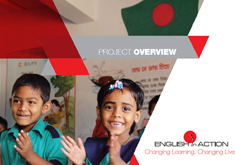A series of English in Action (EIA) introductory workshops have taken place across Bangladesh, marking the commencement of the up-scaling phase. Through these, 4500 teachers from different upazilas are being empowered by EIA’s teaching materials, techniques and mobile technologies.
The training – which involves concentrated introductory workshops, followed by in-school training over 16 months – will enable teachers to teach English using EIA activities in the classroom. In doing so, the way that English is taught and learnt will be transformed.
Preparations began in April 2012 when 514 teachers were selected for interview for the role of Teacher Facilitator (TF). Of these, 229 (including ... Upazila Resource Center Instructors (URCIs) and secondary teachers) were recruited and trained to begin their TF role in May 2012. Twelve introductory workshops, each five days long, were held to familiarize the TFs with their roles and responsibilities. As part of this, the TFs were oriented to the EIA materials, methods and technology, and trained in using these in the classroom. The workshops also developed the TFs’ capacity to run cluster meetings with teachers.
The TFs were enthusiastic during the workshops and found the EIA activities and materials to be very useful, although unconventional, for the classroom. After the five-day workshops, most left believing in themselves, and with confidence and positivity about their roles as TFs.
Following on from this, in June–July 2012, 89 introductory teacher workshops were held across the country involving 4500 primary and secondary teachers. These workshops were facilitated in the different divisions through teams of EIA Core Trainers, Open University Trainers and the recently-trained TFs from various upazilas.
These workshops have inducted the teachers in the EIA approach and welcomed them into the EIA family. Like the TF workshops, the teacher workshops have introduced the EIA materials, techniques and technology. They have also provided opportunities for the teachers to practice classes and work with other teachers, for example, brainstorming on how to make English classes more fun and enjoyable for students.
The teachers’ responses to these workshops were very positive. They were enthusiastic and excited about the project’s approaches and felt confident about applying what they have learnt in their classrooms. Reflecting at the end of the training, Assistant Teacher Abdul Ghoni, from Mirpur said, “what English in Action has given me in 2½ days, I haven’t learned in 2½ years. I am very lucky to know English in Action”.
What is more, the newly inducted teachers are going back to their classrooms and are trying out the activities with success. TF Sumon Lenard Rozario reports that his students are enjoying their English lessons and showing enthusiasm: “They are now really enjoying their English classes very much with EIA materials. They are now getting interest in their English classes. As a result they are much more attentive than before. So, they are now not afraid of or bored in their English classes. Rather, they wait for it eagerly”.
- +88 (02) 984 2161
- info@eiabd.com
News 2012
English in Action programme is a UK Government
funded programme implemented by the
Government of Bangladesh and managed by
Cambridge Education, a member of Mott MacDonald.






